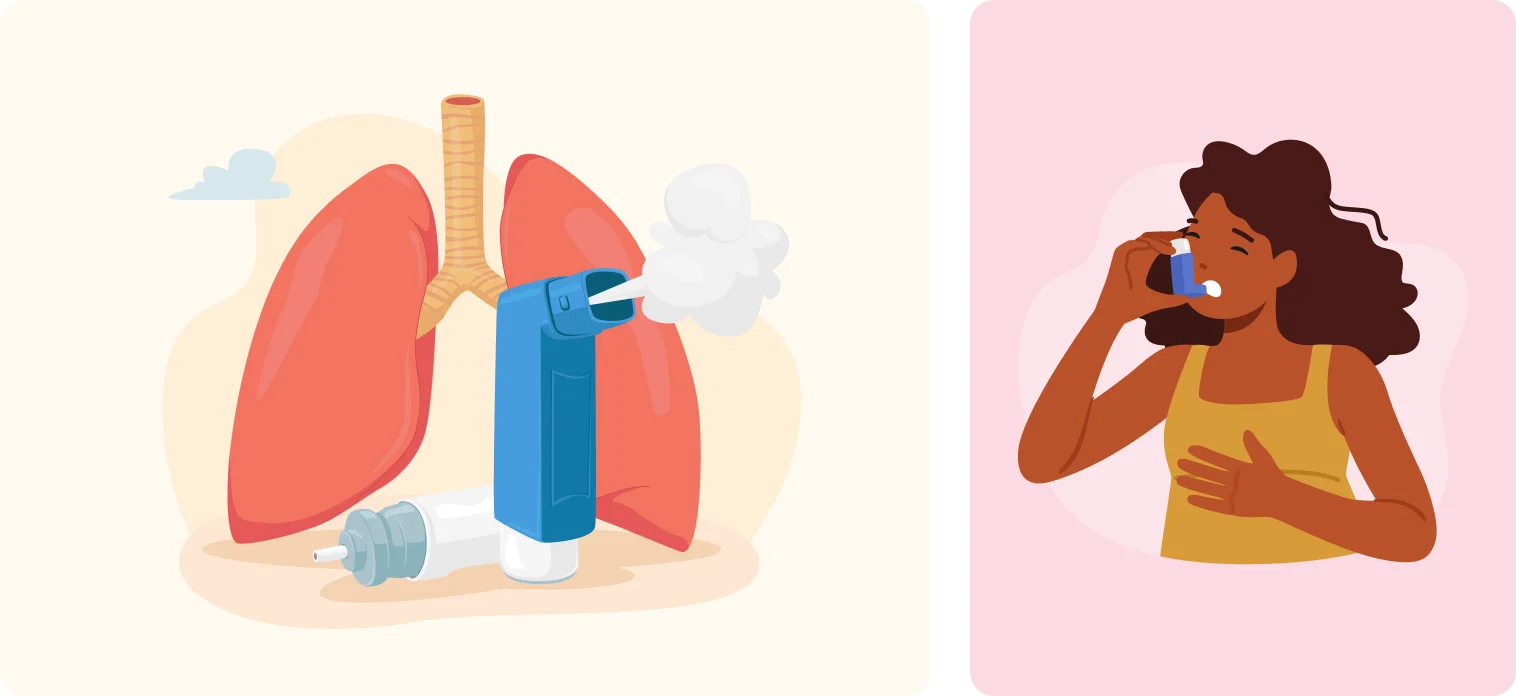Overview
Asthma is a common chronic respiratory condition in which the airways in your lungs narrow or swell (become inflamed) and may produce extra mucous causing difficulty breathing, episodes of coughing, wheezing, and shortness of breath.
Asthma often starts in childhood, but it can also develop for the first time in adults. And symptoms can vary from being just a mild nuisance to being life-threatening.

Causes
There are several different types of asthma (allergic, non-allergic, nocturnal, occupational, exercise-induced, etc.). All are caused by swelling of the breathing tubes that carry air in and out of your lungs. This inflammation may occur randomly or after exposure to a trigger. Here are some common triggers to look out for:
- Allergic reaction to pollen, pet dander, dust mites
- Air pollution, smoke, medications, and weather conditions (cold air, humidity)
- Chemicals, workplace fumes or irritants
- Chronic inflammation of the respiratory airways, which makes them overly sensitive and reactive (hyper-responsive) to various triggers
- Respiratory infections such as colds or flu
- Sulfates in some foods and beverages (especially beer and wine)
- Exercise (especially when it is cold and dry)
- Strong emotions or stress
- GERD, a conditions where stomach acids back up into your throat
- Your genetics—asthma tends to run in families
Symptoms
Some people with asthma experience intermittent flare-ups while others have symptoms the majority of the time (persistent asthma). Symptoms can be mild, moderate or severe. And they can worse at certain times of the day, such as at night or early in the morning. Asthma attacks can also be life threatening, so while highly manageable, any symptoms should be taken seriously.
Here are some common symptoms to look out for:
- Wheezing—a high-pitched whistling sound that is typically heard when a person breathes out
- Shortness of breath or breathlessness
- Coughing
- Tight chest or chest pain
Treatment
As of now, there is no cure for asthma. So treatment is aimed at controlling symptoms, usually by breathing in medicines using an inhaler, also called a puffer. Sometimes these medicines are given as tablets, capsules or syrup for people who cannot use an inhaler very well.
Medication types:
- Reliever medications, such as Salbutamol, are known as short-acting beta agonists. They provide rapid relief during asthma attacks by relaxing the muscles around the airways.
- Preventer medications are for daily use and often include corticosteroids. They work to reduce inflammation in the airways over time and the frequency of asthma attacks.
- Montelukast, sold as Singulair, is a leukotriene receptor antagonist used to prevent the symptoms of asthma. It is typically used alongside inhaled corticosteroids, and is available in tablet form. Your healthcare provider may prescribe montelukast if your asthma is mild to stop it from getting worse or if you have breathing difficulties when your exercise (exercise-induced asthma) or if you have seasonal allergies, such as hay fever. Do not use montelukast to treat an asthma attack. Always use your reliever inhaler.
In addition to medications, lifestyle modifications, such as improving exercise and nutrition, play a crucial role in asthma treatment.
Lifestyle changes may also include:
- Identifying and avoiding asthma triggers, such as allergens or irritants, maintaining a healthy weight, and adopting strategies to manage stress.
- Regular monitoring of asthma symptoms, lung function, and peak flow measurements,
- Development of personalized action plans in collaboration with healthcare professionals, further enhance asthma management efforts.
Be aware that the symptoms and severity of your asthma can change over time, so it is good idea to keep track of you signs and work with your GP. For example, if you notice you start needing to use your inhaler more often, it probably means your symptoms are worsening.
Inhalers & Pharmacy Asthma Aids
From inhalers delivering rapid relief during asthma attacks to devices optimizing medication delivery, pharmacy aids serve as indispensable allies in the journey towards achieving optimal control.
While many of these are available over-the-counter, you should consult with your healthcare provider before taking them. And be sure to adhere to the correct dosage.
Common pharmacy aids include:
- Reliever Inhalers (Short-Acting Beta Agonists) contain medications such as salbutamol or terbutaline, which provide rapid relief of asthma symptoms by relaxing the muscles around the airways, making breathing easier during an attack.
- Preventer Inhalers (Steroid Inhalers) contain corticosteroids, such as beclometasone or fluticasone, which help reduce inflammation in the airways over time. Regular use of preventer inhalers can help prevent symptoms and reduce the frequency of attacks.
- Combination Inhalers, such as Seretide and Fostair, contain both a corticosteroid and a long-acting beta agonist (LABA). These inhalers contain both a preventer medication to reduce inflammation and a long-acting bronchodilator to keep the airways open.
- Spacer Devices attach to inhalers to improve the delivery of medication to the lungs. They help ensure that more medication reaches the airways and reduce the risk of side effects like oral thrush.
- Peak Flow Meters are handheld devices you can use to measure how fast a you can blow air out of your lungs. Regular peak flow monitoring can help individuals track changes in lung function and identify asthma triggers or exacerbations early.
- Antihistamines also work effectively to reduce inflammation in the majority of asthmatic patients.
FAQs
Can asthma develop at any age?
Yes, asthma can develop at any age. Although it often starts in childhood, it’s possible for adults who have never experienced symptoms before to develop the condition later in life.
Is asthma contagious?
No, asthma is not contagious. It is a chronic respiratory condition often triggered by environmental factors or genetic predisposition.
Can asthma be fatal?
In severe cases, asthma attacks can be life-threatening, but with proper management and treatment, fatalities are rare.
Can I manage my asthma without medication?
While medication is often necessary to control asthma symptoms effectively, certain lifestyle changes and environmental modifications can complement treatment.
More Info
To get more information about asthma, visit the NHS condition page.



















